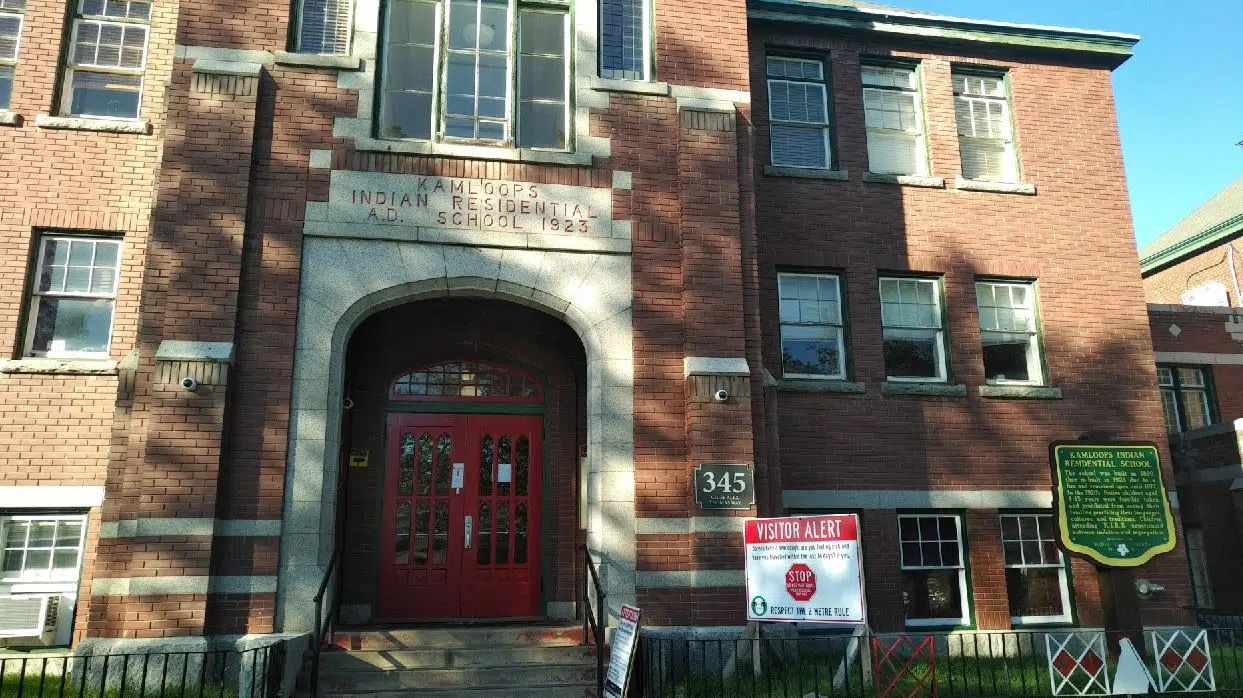
Editors note: The contents of this story may be triggering to some readers. A list of resources is listed below.
Chief and Council at Tk’emlúps te Secwepemc will be working with band members on the next steps to survey the grounds at the former Kamloops Indian Residential School.
Kukpi7 Rosanne Casimir says there is a lot of work still to be done as only two of out 160 acres have been surveyed with ground penetrating radar.
“We definitely know that there’s a lot more work to do. We do know that only a portion of the ground was surveyed,” she said. “We know that we are going to be doing that work because we still have so many unanswered questions.”
Casimir didn’t directly say if unmarked graves will be dug up but has said the band wants to identify remains buried at the former school.
“Our membership, our people, our brothers and sisters throughout Secwepemc’uluw and throughout the province, they want to know the truth as well,” she added. “So as we go through each stage, we will be making those determinations.”
The survey work in May was led by Dr. Sarah Beaulieu of the University of Fraser Valley, who said the total number of people potentially buried at the Kamloops Residential School is not yet known.
At the time, Tk’emlúps indicated there were 215 unmarked graves found. Speaking yesterday, Beaulieu said that 200 “targets of interest,” or probable graves were identified by ground penetrating radar.
“My report identifies some of these probable locations. There remain over 160 acres that still require surveying before these numbers can be finalized,” she added. “I must indicate that this is the first part of an investigation with a knowing and oral histories that tell us there remains much more work to be done.”
Moving forward, Beaulieu says only exhumation of the graves will verify the findings but she notes she is confident in them.
“These results are as conclusive as GPR [ground-penetrating radar] allows,” she said. “Only forensic investigation with excavation will provide definitive results.”
One of the next steps, Casimir said, will be to look at student records to try and identify the remains found at the site.
For that to happen, she says there needs to a be a full disclosure of records from the government and the Missionary Oblates of Mary Immaculate which ran the school for most of its existence.
“There has never been an apology from the highest level of the Roman Catholic Church,” she said. “To be clear the Roman Catholic Church has repeatedly refused to apologize for the numerous and horrific abuses through the residential schools system.”
“We are not here for retaliation. We are here for truth-telling.”
Support services for residential school survivors in British Columbia:
* The KUU-US Crisis Line Society provides a 24-hour, provincewide Indigenous crisis line for Indigenous peoples in B.C. Adults, call 250 723-4050. Children and youth, call 250 723-2040. Toll-free: 1 800 588-8717
* First Nations and Inuit Hope for Wellness Help Line for Indigenous people across Canada toll-free 1 855 242-3310 or chat online: https://www.hopeforwellness.ca/
* The Métis Crisis Line for Métis people in B.C., available 24 hours a day at 1 833 MétisBC: 1 833 638-4722
* Tsow Tun Le Lum for Indigenous peoples in B.C., phone: 1 888 403-3123
* Indian Residential School Survivors Society, phone: 1 800 721-0066 or 604 985-4464
* 24-Hour National Crisis Line for residential school survivors and others affected: 1 866 925-4419
















